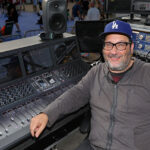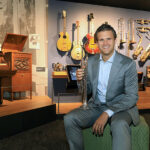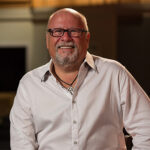No, we didn’t change our name to MON magazine, but this month we recognize the art of monitor mixing.
The OTHER end of the snake: A place so foreign to most of us FOH personnel that just the very thought of going there makes us shudder with anticipation of horrible-yelling rock stars in a relentless barrage of insults and abuse. In fact, as a FOH engineer, the closest I ever want to get to that world is to check mic placement on stage.
I am, however, in the unique position of an FOH engineer who occasionally mixes monitors and started my career as a monitor engineer. So, when I see a talented engineer over there in the heart of the war zone, I have a lot of respect and admiration for them. I have had the good fortune to work with some of the best monitor engineers in this business, and have even learned a lot about how to communicate with that elusive, temperamental beast known as a pop star from them.
When Bill Evans asked me who I thought should have the monitor engineer profile in the first ever issue of FOH devoted to the art of monitor mixing, I immediately said Kevin “Tater” McCarthy. In his 20-plus years in this industry, he has seen it all as an assistant to some of the most famous monitor engineers in the business, and as an engineer in his own right who has worked with numerous multi-platinum-selling bands. Bill also said, “Hey, why don’t YOU interview him?” Wiping the sweat from my brow, I agreed and said, “well, this could be the worst decision you have ever made as the editor of FOH, but I’ll give it a shot.” As this is my first foray into journalism, I am as nervous as a monitor engineer that keeps throwing 2K brain darts at his artist, but here goes:

Let’s start from the beginning. What artists or records changed your life and made you want to be part of this business?
Kevin “Tater” McCarthy: Black Sabbath’s first record introduced me to music, and Van Halen made me want to get into the music business. I went to see many VH shows and that is how I learned about Showco for which I worked for from 1987 to 1997. But my first concert was Elvis at the Pontiac Silverdome in 1977, though I do not remember much of it.
Was there a definitive moment that you can remember when you said, ‘Mom and Dad, medical school is out of the question… I want to tour with rock bands’?
No, medical school or ANY other school was not in the equation for me. I was the only person in my class not to apply to a college. At least that is what my principal said.
So, the history. Where does it all begin? Were you a musician? technician? Car mechanic?
Car mechanic, I think that is a Detroit joke. I was an awful bass player in a rock band during junior high and high school. But I got more involved with the PA system than practicing the bass. The guy who did our sound, Jeremy Wyatt, moved to Dallas from Detroit after high school because his dad got transferred. He, on a whim, went and applied for a job at Showco as a bench tech and got the job that day. He was then instrumental in get-ting me a job there.
You have worked with some of the best engineers in this business (and probably some of the worst). What have you learned or taken away from those experiences?
Great question. You learn a little something from all the people you work with and take a little from each. What TO do, and what NOT to do. This business is a job and a lifestyle, so most of the things that I have learned are not audio related. This job is so much more than audio. For example, I still remember the guy who taught me how to pack a truck properly.
So one of the favorite past times of roadies is to sit around telling old stories of past tours. Without incriminating yourself, what is your favorite road story? (And, yes, you can change the names to protect the guilty.)
Where do I start? My whole adult life is a road story. I have forgotten more stories than I can remember.

As a monitor engineer you often work closely with artists. What is the single most important tool you have developed over your career to work so closely with them?
I would have to say listen to what the artist has to say. You are out there as an employee to mix their sound — you are not hired to be their friend or someone to hang out with. You have two ears and one mouth for a reason. You need to listen twice as much as you talk.
This is one of the smallest little industries in the world. It seems that there are a small group of people getting most of the work. What is your “secret weapon” that has made you part of that elite group?
Elite group. I like that. I have no secret weapon, though I never worry about getting work. I think as soon as you worry about it, the work will stop coming. I have been lucky enough to work with some great people, bands and companies that have not lost my phone number yet.
What is the most common mistake that young monitor engineers make either sonically OR politically?
Sonically, not working with the FOH sound as part of their stage sound. Know your console. A monitor mixer looking at his desk all the time and not the band is not doing his job. Politically, I would say that the most common mistake is opening your mouth at the wrong time. Especially when discussing audio with people who clearly do not understand the logistics, etc.
What would you have done differently in your career, if anything?
I have to say not much at this point.
Have you ever mixed FOH and why do you like being a monitor engineer over being a FOH engineer? What are the pros and cons?
I have mixed FOH twice for Alice Cooper when the FOH mixer could not do the show. I get my satisfaction out of mixing sound to the artist. People do ask, ‘When are you going to move out to FOH?’ I am not. I am a monitor mixer.
We always make the joke – “FOH engineers have L&R to mix and monitor engineers have 32+ mixes.” There is no question that being a monitor engineer is hard. What tools do you use to keep track of all that audio?
There is only one tool — your ears.
What is your favorite piece of gear right now and why?
Right now, I would have to say digital consoles. I did once say, ‘I will quit this business before I use one of those,’ but I would have it no other way now.
It takes a certain amount of Obsessive Compulsive Disorder to do what we do. What other qualities do you have to have to be a good monitor engineer, and how have you exploited those qualities in yourself to further your career?
Well, if anyone has been near my monitor world, Obsessive Compulsive would be one way to describe it. I hate a messy and unorganized work area. Staying calm as a monitor mixer is the best quality to have and I try to use that as an advantage.
Wedges versus in-ears? In your career, you have seen it go from ridiculous loud wedges, to quiet stages with pristine PM mixes. Which do you like to mix? Both have challenges — what are they?
Two totally different animals entirely. I love them both for different reasons. A lot of things we do on the stage end usually do not have good audio practices in mind, which lead to many challenges. For wedges, a common practice now is hanging them under grill decks. Hanging a wedge and not having a floor changes the sound entirely, plus shooting thru metal grating is no help either. In PMs, I would have to say frequency coordina-tion and fit. Fitting and sealing issues can be very bothersome and seem to be out of your control. That is why I carry a fitting kit that I came up with that contains tools and audiologist equipment to refit the PMs on the road.
How about the unique challenge of PMs AND wedges?
This is pretty much commonplace, at least for me and the bands that I work with, but for different reasons. My first gig mixing PMs was 1992 with a band called Trixter. Since then, every band I have done has been with PMs and wedges. Wedges are used with PMs for pressure, sub, backline and some as just a backup. So each of the situations change your approach. The biggest challenge comes from the ONE ear with wedges combina-tion and having the artist keep his PM volume at a reasonable level — watts versus milliwatts.
It seems like more and more stages are getting quieter, which seems to make our job easier. Do you find that the monitor engineers’ job has gotten a lot less “combat” audio and a lot more refined audio?
Of course, when I started doing monitors just getting the vocal loud enough was all it took. Now you have to create a multitude of pristine sounding stereo mixes, which is keeping the stage volumes down. The job has definitely changed — it has gone from defense to offense. The "combat" now comes from wireless frequency coordination more than anything else.
It seems like every five years or so there are large advancements in technology in live sound (e.g. analog consoles to digital consoles). How do you keep up with it and adapt? Is it a bit like teaching an old dog new tricks? Do you find that you stick with gear that you know and love, even though there is newer technology now?
Yes, I normally stick with gear that I am comfortable with, but you have to keep up with the technology. If not, I would still be using a 32-channel Harrison SM-5 with a deep rack full of Klark 360s. Though in many situations gear that you want to use will not work for many reasons (size, weight, expense, endorsements, etc.) other than audio. So, you have to be ready to change. When you are constantly working, it is very hard to get your hands on new gear. Many manufacturers these days are great with sending demos, loaners or even bringing consoles down to where you are at.
How much “homework” do you do prior to working with an artist? Do you listen to their records or watch previous live video footage?
That all depends on the time given. I usually do not like to go in knowing too much. I work more on getting them to fit into gear configurations that I am successful with. For Linkin Park, the first time I worked with them I had no time at all. I did it on a break of a Godsmack tour. I flew in from Japan right to the rehearsal studio and the band came in a few hours later.
What is your favorite Tequila and why? As a professional “mixer,” please disclose your favorite Tequila drink recipe.
I leave all that “mixing” to my assistant Paul White. Blancos or Silvers are my favorite. Don Ramon, Corralejo, Cabo, Patron and Herradura all work well with just a half-squeezed lime over ice.
SIDE NOTE: A quick question for Paul White, Kevin’s assistant for several years…
How do you keep Tater happy?
When I first started working with Tater, I realized he is a freak about keeping things the same and in order. To the extreme. Then I realized that this is the key to his success. But when he pisses me off, all I have to do is mess up one of his drawers in his workbox to keep him in line.



